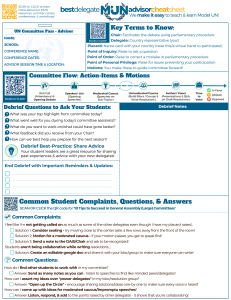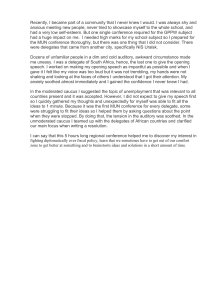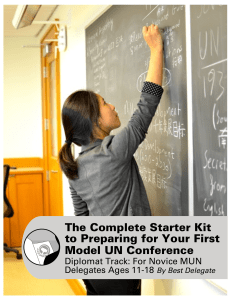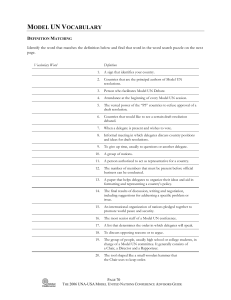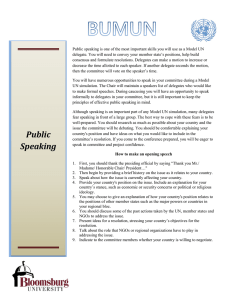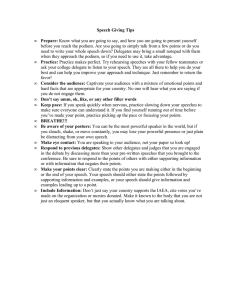Model UN Conference Prep Guide: Research & Position Papers
advertisement
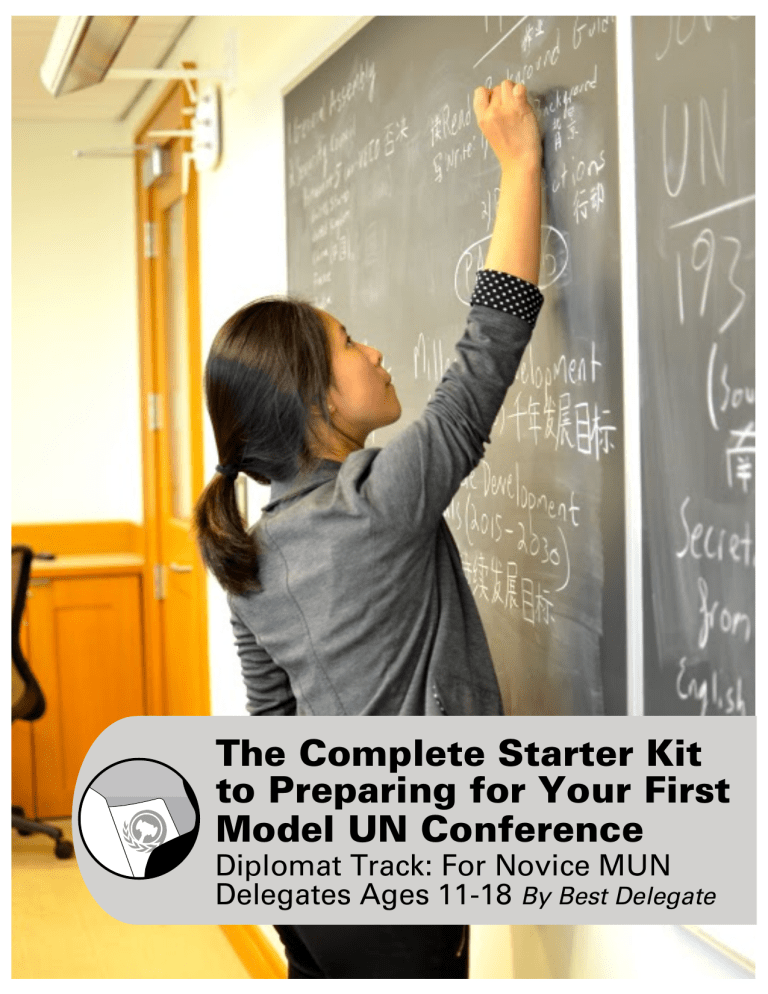
Preparing for our irst MUN Conf rence Preparation is a critical part of any Model UN conference- you need to come prepared so you can deliver informed speeches, make strong arguments while negotiating, and write innovative and realistic resolutions on your committee topics. Preparation and research needs to focus on both your country and your topics, and it can add up to a lot of information that there’s no way for you to memorize! Here’s a sample conference preparation timeline: Before the Conference 6 weeks before Print off and read the “Background Guide” for your committee. This is provided by the conference and can usually be found online. 5 weeks before Put your “Background Guide” into a binder to hold all your information. This is called a “Research Binder”. Start filling it with information you find researching your country and topic. 4 weeks before Complete a “Country Profile”, researching your assigned country. 2-3 weeks before 1 week before Research your topic- specifically the Topic Background, Past International Action, Country Policy, and Possible Solutions Write an “Opening Speech” and practice it before the conference! Researching your Country Profile Physical Geography Culture What is your country’s official name? What is your country’s population? What region of the world is your country located in? What is your country’s ethnic composition? How big is your country? (square miles) What is your country’s official language? What other languages are spoken? Who are your country’s neighbors? How would you describe your country’s physical features and climate? What is your country’s capital? What are some of the major cities? How would you describe the quality of life in your country? Politics & Goverment Economy When was your country founded? What is your country’s total Gross Domestic Product? What type of government does your country have? What are some of your country’s natural resources? Who are some of your country’s leaders? What is your country’s currency? How many people serve in your country’s military? What are your country’s major imports and exports? Who are your country’s allies? Enemies? What are your country’s biggest trading partners? — Copyright Best Delegate LLC 201 — Your first step in assembling your research binder should be your country profile- a research packet about what country you’re going to represent! While you may not need to know what your 8th biggest export is, it’s critical to have a decent understanding of your country if you want to represent them in debate. There are many resources to help your research your country. While many resources may be provided by the countries themselves, there are also several credible databases that share information about countries visit the Best Delegate Country Profile and Policy Map to check them out! Researching Topic Background After researching your country, you should begin looking into the topic that you’re going to be discussing. It’s important to have a good base of understanding about your topic before you dive in and try to decipher how your country feels about that topic. There are numerous resources on UN websites and across the internet about your topic- even Wikipedia is a good place to start, so you can use their sources at the bottom to find more information about your topic. You should have a strong historical understanding of your topic, as well as the causes and impacts of the issue you’re discussing so that you can come prepared to committee on the first day of the conference. Researching Past International Action and Country Policy To understand how to represent your country at the UN, you need to know two things- what the international community has already done about the topic, and what your country wants to do about it. To find Past International Action, you can try looking through news sources, but you can also read past UN reports and resolutions on the issue. The UN Official Documentation Services can help you determine what the UN has done about the topic already. A similar solution can be found for your country’s policy on the issue- by looking at the websites of your country’s government, foreign ministry, or UN mission, you can find statements and actions related to the topic you’re discussing. Researching Solutions While researching UN and government websites can be helpful to learn about what the UN has done about your topic in the past, they may not be as helpful as you’d like for finding new solutions to these issues you’re researching! However, Non-Governmental Organizations (NGOs) can be great resources to find solutions to the topic you’re researching. Also, Think Tanks and University Researchers may have published ideas on how the issue can be fixed, and looking through their ideas can be great ways to brainstorm ideas on how to take these issues. The most important thing for finding solutions to these problems, however, is your creativity! Think of ways the UN and Member States could work together to combat this issue in realistic ways, and plan how these solutions would work in your words! — Copyright Best Delegate LLC 201 — How to rite a Position Paper Many Model UN conferences require delegates to submit “Position Papers” on their topics before a conference starts to demonstrate their research and knowledge. Position Papers are normally 1-2 pages per topic, and should have 3-4 paragraphs. They should be written from the perspective of the government of your country, include a header, and answering the following questions. Your final Position Paper should look similar to the sample on the next page. Heading Committee: [Your Committee Title] Topic: [Your Topic] Country: [Your Country] School: [Your School] Topic Background What is the definition of the topic? Where does the topic take place? Who is involved? How many people does it affect? Where, and in what ways? Why is this topic important? Past International Action Have there been any interesting statements by UN officials on this topic? Try to find a quote. What are the most important UN resolutions and treaties on this topic? Do any major Non-Governmental Organizations (NGOs) work on this topic? Country Policy How has this topic impacted your country? What has your country tried to do about this topic? What types of policies would your country want the UN to adopt (or not adopt) on this topic? Possible Solutions What specific plans would your country like the UN to undertake to address this issue? What specific plans would your country like Members States to undertake in their own countries? Why would your ideas work? Give specific plans. — Copyright Best Delegate LLC 201 — Position Paper Example Committee: General Assembly Third Committee Topic: Gender Equality Country: Russian Federation School: Best Delegate High School According to UN Women, gender equality refers to “the equal rights, responsibilities and opportunities of women and men and girls and boys.” Gender inequality is a global issue: many women lack adequate access to healthcare, are underrepresented in political arenas (women hold only 22% of parliamentary seats worldwide), are victims of gender-based violence (approximately one in three women worldwide have experienced physical or sexual violence), face discrimination in the workplace and in wages, and lack equal access to education (two-thirds of illiterate adults are women). These issues have myriad causes, including cultural beliefs about gender and marital roles, and legal regulation. These detrimental inequalities are cyclical and complex: a female’s educational career, for example, is affected by pregnancy, household work, access to sanitation facilities at school, and the danger of physical and sexual assault. The creation of United Nations Women in 2010 through resolution A/64/588 was a “historic step” in achieving gender equality, by “bringing together resources and mandates for greater impact”. In addition to UN Women, the main mechanism to promote gender equality worldwide is the legallybinding Convention of the Elimination of All Forms of Discrimination Against Women (CEDAW), adopted in 1979 with nearly universal participation. The UN General Assembly has also recently adopted A/RES/69/149 on combatting trafficking of women and girls, A/RES/69/147 to eliminate violence against women, and A/RES/69/236 to emphasize the role of women in development. Through these resolutions, organisms, and NGO partners, the UN and Member States work to invest in women, provide legal protections, and educate women to accomplish these goals and achieve gender equality. Given the integral role of women’s economic equality and independence in achieving gender equality, the Russian Federation strives to ensure that women had equal access to education and employment in order to achieve their potential, as Russian President Vladimir Putin has stated to the UN General Assembly. Russia encourages cooperation between UN Women and Developing Countries, not just Developed Countries. Because of the importance of economic development in empowering women, Russia would like cooperation between UN Women and the International Labor Organization as well as other UN bodies to craft plans for equality based in each nation’s traditional values and norms. Russia also feels it is critical that the United States ratifies CEDAW, as it is the largest nation not to do so. The Russian Federation feels that important subtopics that must be addressed are gender-based violence, women’s lack of access to education and jobs, and women’s lack of representation in politics and political decision-making. To address women’s lack of representation in politics, countries can be encouraged to ensure inclusion of women candidates and create recruitment and training programs to introduce young women to politics. In order to combat and prevent gender based violence, countries can develop crisis centers and hotlines for women and develop rehabilitation programs for victims of violence. Also, Russia believes countries should ensure the safe transport of girls and women to and from schools, invest in hiring female teachers, provide adequate sanitation facilities at schools, and emphasize skill-based hiring programs in all industries, including those normally reserved for men. — Copyright Best Delegate LLC 201 — Public Speaking Public speaking is a highly valuable skill you have the opportunity to develop through Model United Nations. Knowing how to prepare and deliver well-organized and thoughtful speeches will help you in school, your future career, and the rest of your life. At an MUN conference, you will have many opportunities to give speeches. As the representative of your assigned country, you will be expected to speak about your country’s policy on the committee topics and your proposed solutions. There are two main opportunities to make speeches in Model UN: Speakers List: When the committee begins, the hair will create a list of delegates who wish to give speeches. These speeches are typically about the how each country feels about the topic, and range from 1-2 minutes long. The first time you speak on the speakers list is referred to as your opening speech. You should prepare this speech before the conference. After your first speech, you can sent a note to the hair to request to be put on the Speakers List again. Moderated Caucus: Whereas the speakers list is about the topic in general, a moderated caucus is about a specific part of the topic. A moderated caucus has no Speakers List; delegates must raise their placards and wait for the hair to call on them to speak. Each delegate typically gets 30 seconds to 1 minute to speak, and have to focus on the topic of the caucus. Public Speaking Structure One of the easiest way to organize your speeches in Model UN, especially for opening speeches, is to use the following three-part formula: Hook: An engaging way to grab your audience’s attention Point: Your country policy on the topic Call to Action: Your possible solutions to the topic Yield: A delegate surrendering the time remaining after finishing a speech from the Speaker’s List. Decorum: A word used by Chairs to encourage delegates to behave diplomatically. — Copyright Best Delegate LLC 201 — 1. Hook The beginning of a speech should grab your audience’s attention. It should give your audience a reason to listen to you – otherwise they won’t. An attention-grabbing introduction is often called a “hook.” There are many different types of hooks, but here are a few common ones that work well in Model UN. Question: Asking the audience a question is often an easy way to get their attention. Example: “Do you think it is possible for us to live in a world without poverty? The people of my country think so. We believe we can achieve the end of poverty.” Quote: A quote engages the audience when they recognize the figure you’re quoting. Example: “Fifty years ago, United States President John F. Kennedy said, ‘Ask not what your country can do for you, but what you can do for your country.’ Today, ask not what the world can do for you, but what you can do for the world.” Statistic: A statistic can grab an audience’s attention if it is surprising or interesting. Example: “Over 1 billion people around the world live on less than US$1.25 a day. Over 1 billion people live in extreme poverty.” Story: A story is the oldest form of communication and if told well, can certainly grab an audience’s attention. But speeches in MUN are typically very short, so keep the story brief! Example: “Several years ago, in rural Pakistan, a girl was walking to school when a gunshot rang out – and she was shot in the head. The Taliban any girls to go to school. But that girl survived, and today she fights for girls’ right to education around the world. That girl’s name was Malala.” 2. Point The point is the purpose of your speech. It is the reason why you’re speaking. Once you have your audience’s attention, you should deliver your point. In opening speeches in MUN, the “point” is to state your country policy on the topic. Then offer 2-3 reasons explaining why your country had adopted this policy. — Copyright Best Delegate LLC 201 — Example: “The Republic of Korea believes that education is a human right. All people should have access to education. Education is a pathway out of poverty for millions in developing countries, like Korea was just a few decades ago. Education is the driver of change and development in this world, and education is critical for the human race to continue to thrive and grow. 3. Call to Action Good speeches end with a “call to action,” which is when you tell your audience to go and do something. Your call to action is your specific solution to the problem. Example: “To provide universal access to education, Korea proposes the creation of an international fund called ‘Education For All’ that will support 3 programs in developing countries: building more schools, training new teachers, and preventing girls from dropping out of school. We call upon the international community to create and donate to this fund, so we can guarantee education as a right globally.” How to participate in caucuses In Model UN, a “caucus” means a suspension of the traditional Rules of Procedure, which govern what delegates can or cannot do during a conference. There are two types of caucuses, and both serve very different functions. However, throughout a conference delegates will move between the Speakers List, moderated caucuses, and unmoderated caucuses, so it’s important to be ready for all three main phases of debate. Moderated Caucuses: In Moderated Caucuses, you continue to deliver speeches but in a different format. Moderated Caucuses are used to narrow debate to specific parts of the topic- for example, if you’re discussing “Climate Change” as your main topic, you may have a moderated caucus to discuss “Agricultural Impacts of Climate Change”. During a moderated caucus, the next speaker is chosen by the Chair when delegates raise their placards to be called upon. To start a speech in a moderated caucus, you can dive into your argument using Hook, Point, Action, but you can also start by responding to another delegate, by saying “In response to the comments of the delegate of Germany”, for example. Moderated caucuses are more conversational, so feel free to use the more flexible format to more directly debate with other delegates, or to try to convince the committee of your specific solutions. Unmoderated Caucuses: During an Unmoderated Caucus, delegates are free to move around the room and will form into groups to write resolutions. Rather than a focus on debate, unmoderated caucuses are about negotiating resolutions and working together with your group. Groups will form because of common interests or common solutions to the topic, and will try to write the strongest resolution in the committee and lobby other delegates to join and support their group. It’s important to find a group to work with that will allow you to contribute your ideas to the resolution and where everybody can work together fairly to write a great resolution, rather than a group where people may be bullies or trying to dominate all the conversation for themselves. Also, if any delegates are sitting alone during unmoderated caucus, invite them to work with your group! They may have great ideas, and it’s a great way to win more support for your resolution. — Copyright Best Delegate LLC 201 — How to write a resolution resolution is the main result of the work of your committee, and is meant to do exactly what the name implies: “resolve” the problem that your committee is focused on. Resolutions are the documents the UN uses to make decisions, and are written by groups of Member States collaborating on their ideas. Resolutions have two main functions: to determine what the United Nations will do about the issue, and to recommend or request that individual Member States undertake actions to help solve the issue. There is a very specific format to resolutions, and three main sections: the header, the preamble, and the the operative section. Sponsor: An author of all or parts of a resolution, that agree with the content of the resolution. Signatory: A delegate that wishes to see the resolution debated before the committee, but does not necessarily contribute content or agree with the content of the resolution. The Header There are four main pieces of information in the header of the resolution: Committee- The name of the committee you’re representing Topic- The name of the topic you’re debating Sponsors- The main authors that wrote the clauses of the resolution Signatories- The delegates that would like to see this resolution introduced in the committee. They don’t necessarily support the resolution, but want it to have the requisite number of signatories so it can be accepted by the Chair (usually about 20% of the committee is required). Preambular Paragraph: These paragraphs constitute the Preamble of a resolution, and explain why the United Nations is discussing this issue. Also known as Preambulatory Clauses. Operative Paragraph: These paragraphs constitute the actual actions to come from a resolution, and say what the United Nations and Member States will do about it. Also known as Operative Clauses. The Preamble The goal of the preamble of a resolution is to set the scene for the resolution. Here, you can talk about why the resolution is being written, for example by talking about how serious the issue and who it is impacting. You can also refer to past UN Resolutions, Treaties, and International Actions related to the topic. Preambular paragraphs each start with “preambular phrases”, which should be italicized in your resolution. Each preambular paragraph should end in a comma. — Copyright Best Delegate LLC 201 — Preambular Phrases Select a preambular phrase and Italicize it to start your preambular paragraph. Here is a recommended list to start with, though there are over 50 preambular phrases used by the United Nations. Acknowledging Expressing concern Noting Affirming Expressing its appreciation Reaffirming Alarmed by Fully aware Recalling Bearing in mind Guided by Recognizing Deploring Having considered Regretting Emphasizing Mindful of Taking into consideration The Operatives Operative paragraphs determine what action the UN will take on the issue. This can mean funding solutions, directing members of the UN Secretariat what to do, or requesting actions by UN Member States. Each paragraph takes action, so it’s important to be careful with each of the operative paragraphs in a resolution! Operative paragraphs start with operative phrases, which should be italicized. Each operative paragraph should also be numbered, and end in a semicolon, except for the final operative which ends in a period. If at any point an operative is broken into sub-operatives, you would use a colon to introduce those suboperatives, which start with lowercase letters. Operative Phrases Select an operative phrase to start your operative paragraph, and italicize it. Here is a recommended list to start with, though there are over 100 operative phrases used by the United Nations. Acknowledges Adopts Affirms Approves Authorizes Believes that Calls attention to Calls upon Member States Condemns Confirms Insists that Recommends Decides Instructs Reminds Demands Invites Requests Determines that Notes that Resolves Emphasizes Demands Suggests that Endorses the Declaration Determines that Supports Establishes Realizes Takes note Expresses its appreciation Recalls Urges Expresses its concern Recognizes Welcomes — Copyright Best Delegate LLC 201 —
